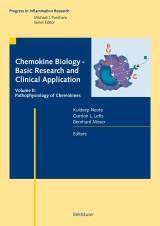Details

Chemokine Biology - Basic Research and Clinical Application
Vol. 2: Pathophysiology of ChemokinesProgress in Inflammation Research
|
96,29 € |
|
| Verlag: | Birkhäuser |
| Format: | |
| Veröffentl.: | 08.08.2007 |
| ISBN/EAN: | 9783764374372 |
| Sprache: | englisch |
| Anzahl Seiten: | 180 |
Dieses eBook enthält ein Wasserzeichen.
Beschreibungen
<P>Chemokines play an important role in recruiting inflammatory cells into tissues in response to infection and inflammation. They also play an important role in coordinating the movement of T-cells, B-cells and dentritic cells, necessary to generate an immune response (response to injury, allergens, antigens, invading microorganisms). They selectively attract leukocytes to inflammatory foci, inducing both cell migration and activation. They are involved in various diseases, like atherosclerosis, lung and skin inflammation, multiple sclerosis, or HIV. <BR>Volume 2 of this two-volume set discusses the pathophysiology of chemokines. It is divided into two parts: a) chemokines in animal disease models, and b) chemokines as drug targets. Together with volume 1, which discusses the immunobiology of chemokines, both volumes give a comprehensive overview of chemokine biology.</P>
<P></P>
<P></P>
Chemokines in animal disease models.- Chemokines in animal models of inflammation.- Autoimmune diseases.- Chemokines in allergic responses: eosinophils, basophils, mast cells.- Chemokines as drug targets.- Chemokines as drug targets.- Screening and characterization of cyclic pentapeptide CXCR4 antagonists/inverse agonists using a pheromone responsive reporter gene in Saccharomyces cerevisiae: Utility of G protein coupled receptor constitutively active mutants.- Antagonists of CXCR3: a review of current progress.- IL-8 receptor antagonist: basic research and clinical utility.- Current status of CCR1 antagonists in clinical trials.- Small molecule CCR2 antagonists.- Chemokine axes in hematopoietic stem cell mobilization.- CCR5 antagonists: from discovery to clinical efficacy.
<P>Chemokines play an important role in recruiting inflammatory cells into tissues in response to infection and inflammation. They also play an important role in coordinating the movement of T-cells, B-cells and dentritic cells, necessary to generate an immune response (response to injury, allergens, antigens, invading microorganisms). They selectively attract leukocytes to inflammatory foci, inducing both cell migration and activation. They are involved in various diseases, like atherosclerosis, lung and skin inflammation, multiple sclerosis, or HIV.<BR>Volume 2 of this two-volume set discusses the pathophysiology of chemokines. It is divided into two parts: a) chemokines in animal disease models, and b) chemokines as drug targets. Together with volume 1, which discusses the immunobiology of chemokines, both volumes give a comprehensive overview of chemokine biology.</P>
<P></P>
<P></P>
Comprehensive and up-to-date overview of the field Both volumes complement each other, but can also be used independently from each other Written by leading experts in the field The volume editors organized several international conferences on chemokines Includes supplementary material: sn.pub/extras
-
-
© 2024 media control GmbH
Alle Preise enthalten die gesetzliche Mehrwertsteuer. - AGB
- Impressum
- Datenschutzerklärung
- Kontakt
- FAQ
- Mein Konto
- Home
- Erweiterte Suche
- Widerrufsrecht
- Reader-Software
- Desktop-Ansicht
- Gutschein-Code einlösen


